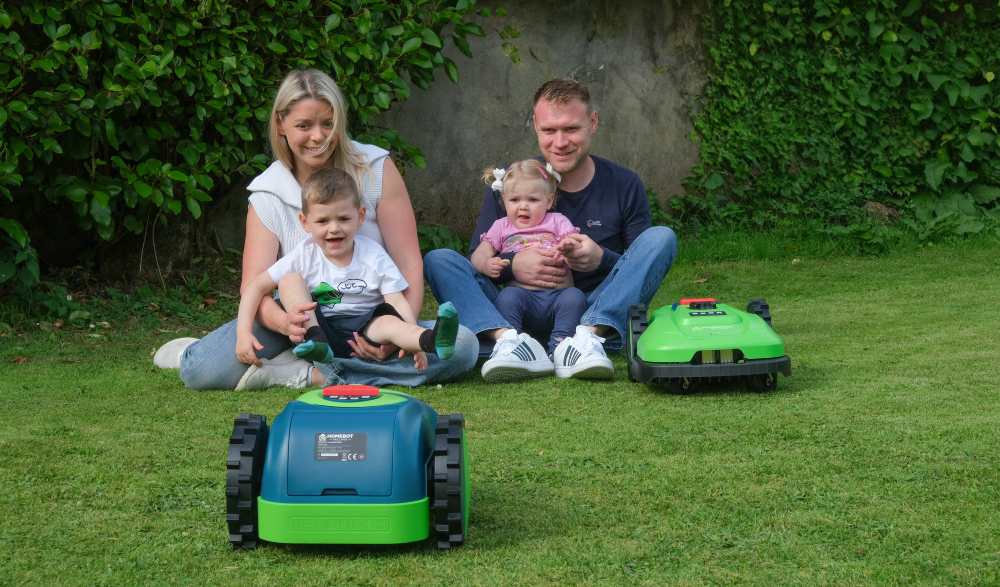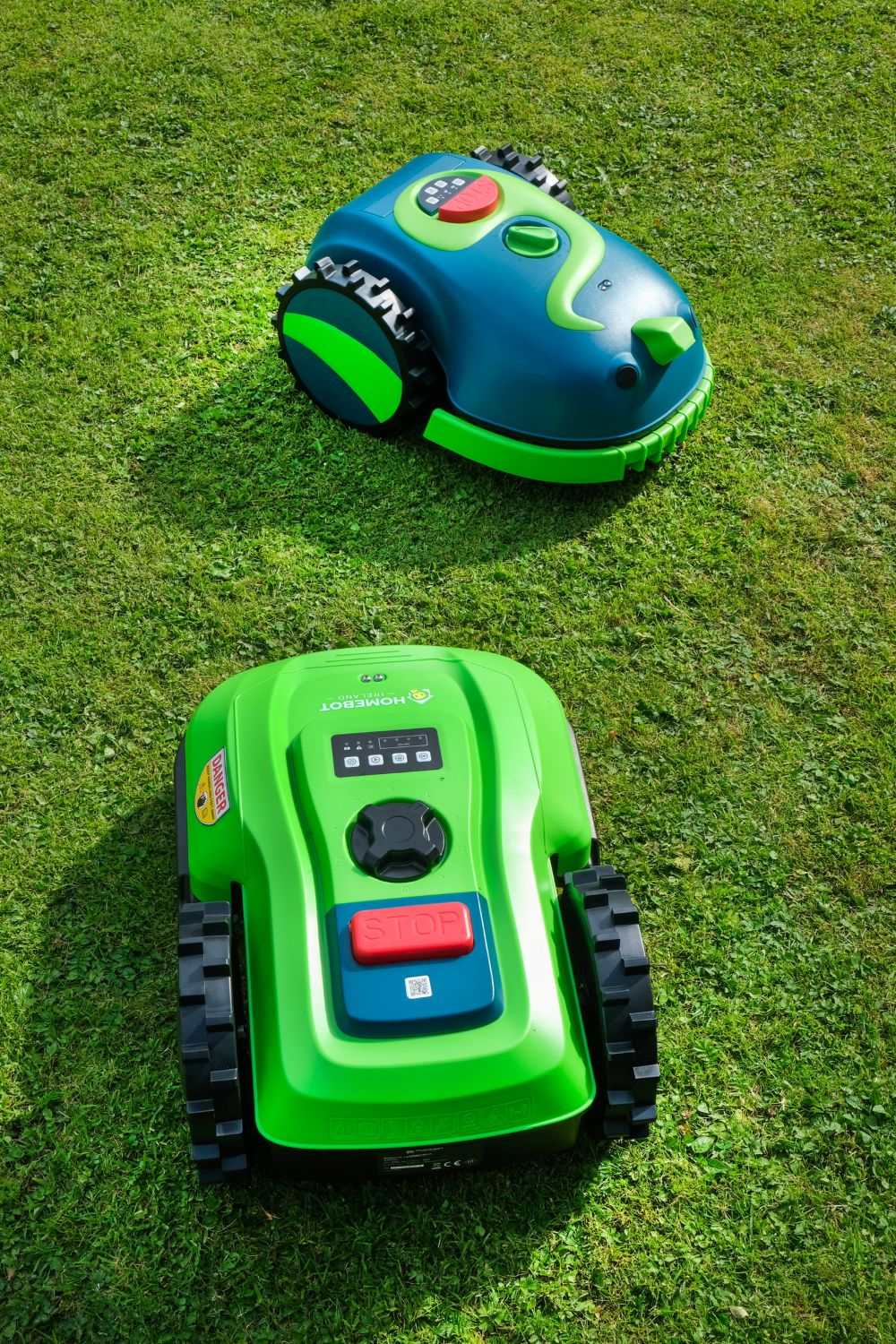Podcast Ep 269: Clara Mulligan on how HomeBot Ireland is automating Irish homes.
When Clara Mulligan watched her elderly father-in-law struggle to lift a heavy lawn mower up and down three garden steps during the Covid pandemic, she never imagined it would spark a new business.
What began as a family safety concern has evolved into HomeBot Ireland, a company at the forefront of Ireland’s rapidly growing home automation market.
“Robots are going to become a lot more accessible and a lot more affordable for the normal household”
“It came about because we moved closer to my father in law during the Covid pandemic, and he is fiercely proud, fiercely independent, and does not want help, but he had three steps up to his garden, and he used to be trying to lift the lawn mower up and down these steps,” Mulligan explains. The situation became more concerning when her father-in-law, determined to help elderly neighbors with their lawns, “did end in him breaking his ankle at one stage, but that didn’t deter him. Six weeks later, he was straight back out doing the same thing.”
The birth of a business
HomeBot Ireland now offers a comprehensive range of home robotics, including robotic lawn mowers, vacuum and mop systems, with window cleaners currently in testing. The company’s journey from concept to market wasn’t quick – it took four years of careful development and testing.
“From the start, Eureka moment in 2020, till we had a product on the market, was four years. It was roughly May 2020, when, when the idea kind of started. And it was the end of May 2024, when we brought a product to market,” Mulligan recalls. “We didn’t want to come to market too early with something that wasn’t ready. So we spent a good few years testing and getting everything ready to go.”
The timing coincided with significant personal challenges. “And throw in a house build for good measure in the mix as well,” she laughs, referring to managing a young family, building a home, and launching a business simultaneously.
The technical foundation of HomeBot Ireland combines business acumen with automotive expertise. Mulligan handles the business side while her husband, a Mercedes specialist with experience in autonomous vehicles, manages the technical development. “My husband’s background is as a motor technician. He is well up with the autonomous cars and AI. Hence we ended up with an AI robot because it’s very similar to the technology.”
The company offers two distinct technologies for robotic lawn mowers, each suited to different garden types and user preferences. The boundary wire-guided ‘Chomper’ uses a thin cable system where “anywhere the wire is, the robot won’t go over it, and anywhere where it’s not it’ll cut. So it’s pretty foolproof.”
The AI robot lawnmower ‘Buddy’ works in a similar manner to self-driving cars. “So you have a library of images a camera, and basically, anything that’s grass is good, it’ll continue to cut. And anything that’s not grass, it’ll stop and turn.”
Challenging Irish attitudes
Perhaps the biggest hurdle HomeBot Ireland faces isn’t technical but cultural. “One of the biggest things for the Irish market to kind of wrap their heads around is how we’re brought up. It’s instilled in us that you do your chores and, you know, the harder you work, the better you are. So there’s this slight consensus from the older generation definitely, that, you know, oh, that’s lazy,” Mulligan observes.
The company’s response to this mindset is encapsulated in their tagline “Your home, just made easier.”
She explains: “So, enjoy your cup of tea while the robots doing the work for you, and don’t feel one bit guilty.”
The numbers support Mulligan’s optimism about the sector’s future. “We’re not able to get individual Irish market figures just yet, but in Europe it was estimated to be worth €650m in 2022 and they expect that to double by 2028 so we’re halfway through that already, and that is the case so far.”
Robot vacuums show even stronger growth projections, with compound annual growth rate of 24% over the next five years, and that will bring that market up to €4.8n by 2030, Mulligan estimates.
She believes this growth is already visible in Ireland, where robotic solutions are expanding beyond homes into sports facilities. “There are more and more GAA pitches that are starting to get robotic lawn mowers. And now there are robotic line painting robots as well, because to paint the lines takes three people, and it’s become regulation now that even in underage games, the lines have to be freshly painted.”
HomeBot Ireland’s approach to customer support addresses one of the biggest challenges in home automation: setup and troubleshooting. “We have a WhatsApp helpline as well. So for the older generation that do decide to make the jump into home automation, we have the video service on WhatsApp. When they’re setting it up, just take a video of whatever’s going on, send it to us, and we’ll just do a personalized video back for you from the office with our own robot here, and it really takes the pain out of it.”
This personalised approach stems from Mulligan’s own frustrating experience with customer service. She recalls purchasing a robot vacuum when her son was six weeks old, only to encounter issues that weren’t resolved due to timing constraints with warranty periods. “By the time I got around to calling customer care, it was day 31 instead of day 30.”
Future-minded innovation
The effectiveness of HomeBot Ireland’s products is perhaps best demonstrated through Mulligan’s personal experience. “I have the large floor cleaning vacuum and mop robot in my house. I haven’t mopped my house by hand in nearly a year at this stage, and the floors are cleaner than they’ve ever been.”
She describes how friends who tested early versions during Covid found their floors so clean that “for about six months, their neighbors used to walk in and go, Oh, you got your floors done. It was just so clean from the robot, the floors looked new.”
The technical superiority of robotic mopping lies in its systematic approach. “The big difference with the mops compared to humans is we mop and we dip our mop back in the bucket, right? So by the time you get to the end of the room, you’re kind of just spreading brownish water around the place at that stage as well.
“Instead, the robots go back to base, wash their mops, put the dirty water into a separate tank, take fresh clean water and go back out so your floors are way cleaner.”
Innovation continues with forthcoming new window cleaning robots that use a suction mechanism to cling to windows. “It has spinning pads where it’ll spin itself all the way up to the top corner and then work over to the other corner and go down in lines.” These devices work both inside and outside, and also do bathroom walls.”
Product pipeline
HomeBot Ireland’s product pipeline includes ambitious projects like robotic solar panel cleaners. “It’s going to be much slow burner because there’s obviously such a variation of shapes on top of houses.”
Mulligan envisions a such system “more like how wipers would work on a car.”
The company maintains a deliberately focused approach to innovation. “We try to be very careful to not get sucked into any of the gimmicks,” Mulligan explains, referencing products that “can sing music to your cat while it vacuums.
“You know, if you’re in work, we prefer to just stick to the task at hand and not kind of add anything like that.”
For now, HomeBot Ireland remains committed to the domestic market. “We are purely focused on Ireland for the foreseeable future. Not that I would rule out exporting by any means, but as you mentioned, we have a young family. We are building house, and I just want to do it to the best of my ability. So I feel if we were to start exporting too early, we would be spread ourselves too thin.”
This strategic patience reflects a broader philosophy about sustainable growth and quality service that has positioned HomeBot Ireland as a leader in Ireland’s home automation revolution.
The robotic future
Mulligan sees robotics becoming integral to daily life, but with clear boundaries. “The lawn mowers and the vacuums, they just take away the day to day tasks. Personally, I don’t think I’d like a robot doing everything for me, but the mundane tasks of the day like laundry, any sort of cleaning tasks, anything like that. I’m perfectly fine with the robots taking over.”
She predicts that humanoid robots will become accessible within the next three to five years. “They’re going to become a lot more accessible and a lot more affordable for the normal household,” she said, pointing to current applications in hotels where robots bring food from the kitchen to the table or the room.
As Ireland embraces home automation, HomeBot Ireland represents more than just technological advancement. It embodies a shift in how we think about work, convenience, and the role of technology in enhancing rather than replacing human activity.
From a father-in-law’s stubborn independence to a thriving business revolutionising Irish homes, Mulligan’s journey illustrates how the best innovations often start with the simplest human needs.
-
Bank of Ireland is welcoming new customers every day – funding investments, working capital and expansions across multiple sectors. To learn more, click here
-
For support in challenging times, click here
-
Listen to the ThinkBusiness Podcast for business insights and inspiration. All episodes are here. You can also listen to the Podcast on:
-
Spotify
-
SoundCloud
-
Apple








